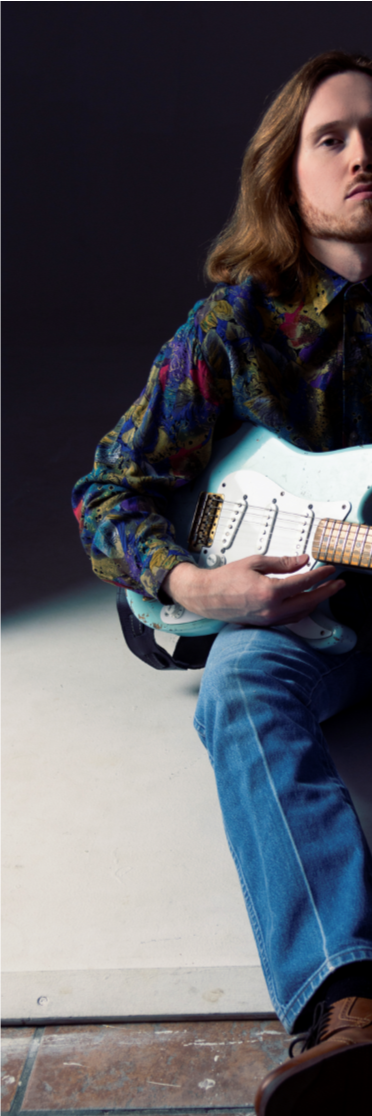Ben Eunson
Ahead of his new album, jazz guitarist Ben Eunson speaks on his experiences with the likes of Questlove, and his earliest musical memories.
Was there any music playing around the house when you were young?
Yes! There was a lot of different music playing around the house when I was growing up - a lot of jazz, a lot of rock, and a lot of classical music. My first memory of ever hearing a guitar was from my Dad’s vinyl copy of ‘Breezin’’ by George Benson when I was very young. In retrospect, I’m very glad that he was my first exposure to the guitar.
Was there a particular album that you always listened to in your childhood?
It would have to be Sgt. Pepper’s by The Beatles. I listened to it every day for almost a whole year when I was 12. It had a huge impact upon me, and is still one of my favorite albums.
How was the jump from Melbourne to NYC as a kid?
I was 21 when I left Melbourne for the US. It was a slightly scary jump at the time, but an exciting one. I visited New York once before I made the move, hanging out in the village hearing my favorite musicians every night for two weeks. I spent most of my teenage years planning out how to get to NYC, and once I did it, I knew it was right for me.
You found and sometimes played in many experimental clubs in Lower Manhattan, out of those, are there any personal favourite venues?
My most formative times as a musician in NYC were spent playing at The 55 Bar, Smalls and Fat Cat - all in the West Village. All three are favorites of mine. A lot of musical experimentation went on for me in those clubs, and in fact I still play at the 55 Bar and Fat Cat from time to time.
How was it working in the studio with Questlove?
I was playing on an album called Playing Chess by Elise LeGrow, which was produced Steve Greenberg and Mike Mangini, who are produced Joss Stone’s biggest hits. They brought in Questlove to play on the album, as well as a few other members of The Roots, like Ray Angry, who I’ve played with in many different situations over the years. I consider one of my mentors. We ended up recording a version of “Long Lonely Nights”, which was written and performed by Questlove’s father, Lee Andrews. It was a special day in the studio.
Which artist did you learn the most from through collaboration?
I probably learnt the most touring with Terri Lyne Carrington. Hearing her play at such a high level every night on tour was a learning experience in itself.
Have you listened to some of the many current artists that have re-invigorated jazz for the modern musical landscape, such as Thundercat, Kamasi Washington, Flying Lotus or BADBADNOTGOOD?
I’ve listened to all of those artists except for BADBADNOTGOOD, who I still need to check out. I’m especially a big fan of Thundercat, Drunk is one of my favorite albums of recent times.
Best Steely Dan album and why?
For me, it would be Gaucho. The writing, the arrangements, the soloists - Gaucho is everything I love about Steely Dan, at it’s best. Also, Steve Khan’s playing on this album is some of my favorite guitar playing ever.
What has changed musically for you in the time between your Autumn EP in 2015, to this new album?
My EP was more of an acoustic jazz recording. It was a musical statement that I felt I needed to make, reflecting on my journey up to that point because I was playing mostly straight-ahead jazz at the time. We recorded it at a small studio in New Jersey in February 2014, and we managed to finish everything in about 5 hours total. There was also a huge blizzard that day, which made the title a little less apt [laughs]. Right after finishing recording Autumn, I started getting called for a wider variety of gigs, and that definitely influenced the direction of my own music and my playing. I also met producer/engineer Michael Perez-Cisneros around that time, and he helped me to bring some of my ideas about various guitar sounds to the surface. So there was a notable change in my own musical direction by the time I started recording ACE.
Now, I see the album’s title is an acronym to its creators’ last names, is there any significance to the cover art?
Yes indeed! The cover art is by Aaron Lowell Denton. I had been aware of Aaron's work for some time, and asked him if he was able to create cover art that visually represented the music. For me, great cover art is such a vital part of an album, and I love what he did for ACE. I think he visually captured the essence of the music.
This album was actually crowdfunded by your fans through Kickstarter. How excited were you when you saw the album successfully kickstarted?
It was a great moment when my Kickstarter was successfully funded. This was my first experience with crowdfunding, and I was blown away by the support I received from all over the world. Crowdfunding is an incredible way to get fans involved with the completion of an album. It’s an indispensable part of the process for many people today, since recording budgets are basically nonexistent. It may even be the way of the future.

![Ben Eunson[new].png](https://images.squarespace-cdn.com/content/v1/5c7069a7348cd957150a4cca/1565950678478-WI0AVNCBGVMG090CNH3U/Ben+Eunson%5Bnew%5D.png)

